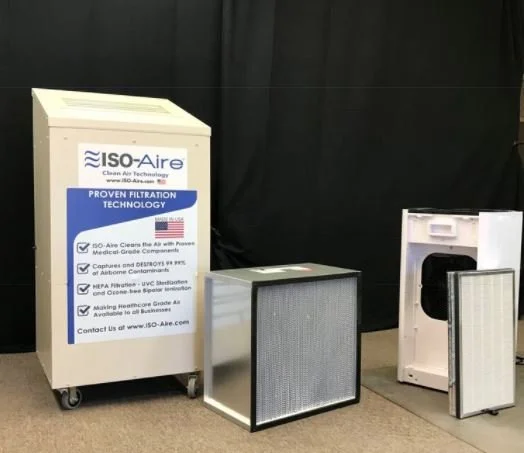NYC Identifies HVAC Systems as An Area of Concern and Looks to HEPA Filters to Help with COVID-19 in New York City
How Can COVID Spread Indoors?
An example of a HEPA filter.
In an update released on June 29, 2020, Governor Cuomo identified HVAC (Heating, Ventilation, and Air Conditioning) systems as one of the top modes for how the COVID-19 virus spreads indoors. Other studies have found that the virus was able to spread to a larger population by spreading from an infected person via a restaurant HVAC system to other parties at the restaurant. In order to open indoor dining facilities, the governor recommended that restaurants and other indoor spaces invest in a HEPA (high efficiency particulate air) filter.
How Can a HEPA Filter Stop COVID?
A HEPA filter is at minimum, 99.97% effective at capturing air particulates such as bacteria, pollen, mold, and viruses. By having multiple layers of pleating, a HEPA filter is the best type of air filter to stop particulates from returning to the air stream. COVID is caused by the SARS-CoV-2 virus, which is found in droplets produced by an infected person. These droplets produced from coughing, laughing, sneezing, breathing can be caught by the HEPA filter. Because of the HEPA filter’s ability to help stop the spread of COVID-19, the installation of HEPA filters have become one of the COVID-19 mitigation strategies that are recommended by the CDC and ASHRAE.
Where Can I Find a HEPA Filter?
The problem with installing a HEPA filter into existing ductwork in a house, restaurant, business, etc., is that the filter will cause the HVAC system to work harder than it can handle. Simply put, it is not easy to just install a HEPA filter without costs reaching six figures. But with a HEPA filter being at the forefront of helping to prevent the spread of COVID-19, installation of a HEPA filter is an important step to take. So how can it work? Well, portable HEPA air purifiers, like our elite ISO-Aire models can enable you to achieve the safety of what a HEPA filter can provide without the exorbitant costs.
The Pros of HEPA Air Purifiers
An ISO-Aire HEPA air purifier (left) compared to a competitor model (right). Notice the difference in thickness in the HEPA filters for each.
Not every building can afford or even accommodate the installation of a HEPA filter. This is where portable air purifiers equipped with a HEPA filter can be the best choice. Not all air purifiers are equal, however, with many gimmicks out there in the field. At ISO-Aire, we are proud to offer the best air purifier, equipped with a 12-inch thick, 99% effective HEPA filter, as well as optional ozone-free bipolar ionization and germicidal ultraviolet-C (UVC) radiation. Our units are the quietest on the market, fully portable or able to be retro-fitted into existing ductwork. Not all air purifiers come with a quality HEPA filter, some only being 3-inches thick, which requires more-frequent filter changes and they also do not have the energy-efficient fan that the ISO-Aire purifier comes with. The costs that come with these frequent air changes, as well as a lower product life, lead to extremely high costs in the long-run. Whereas competitor models only last a few years at the most, our ISO-Aire models last 20-plus years.
Learn more on how operating costs can vary based on air purifier model.
See ISO-Aire’s installation story for the FDNY.




